Related Research Articles

John Keats was an English poet of the second generation of Romantic poets, along with Lord Byron and Percy Bysshe Shelley. His poems had been in publication for less than four years when he died of tuberculosis at the age of 25. They were indifferently received in his lifetime, but his fame grew rapidly after his death. By the end of the century, he was placed in the canon of English literature, strongly influencing many writers of the Pre-Raphaelite Brotherhood; the Encyclopædia Britannica of 1888 called one ode "one of the final masterpieces".

Emily Elizabeth Dickinson was an American poet. Little-known during her life, she has since been regarded as one of the most important figures in American poetry. Dickinson was born in Amherst, Massachusetts, into a prominent family with strong ties to its community. After studying at the Amherst Academy for seven years in her youth, she briefly attended the Mount Holyoke Female Seminary before returning to her family's home in Amherst. Evidence suggests that Dickinson lived much of her life in isolation. Considered an eccentric by locals, she developed a penchant for white clothing and was known for her reluctance to greet guests or, later in life, even to leave her bedroom. Dickinson never married, and most of her friendships were based entirely upon correspondence.

Amy Lawrence Lowell was an American poet of the imagist school. She posthumously won the Pulitzer Prize for Poetry in 1926.
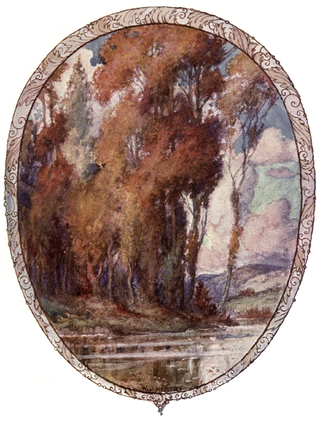
"To Autumn" is a poem by English Romantic poet John Keats. The work was composed on 19 September 1819 and published in 1820 in a volume of Keats's poetry that included Lamia and The Eve of St. Agnes. "To Autumn" is the final work in a group of poems known as Keats's "1819 odes". Although personal problems left him little time to devote to poetry in 1819, he composed "To Autumn" after a walk near Winchester one autumnal evening. The work marks the end of his poetic career, as he needed to earn money and could no longer devote himself to the lifestyle of a poet. A little over a year after the publication of "To Autumn", Keats died in Rome.
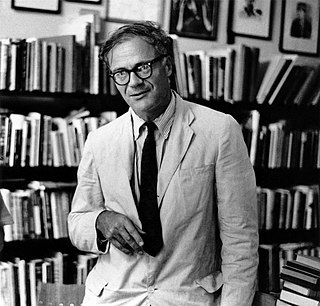
Robert Traill Spence Lowell IV was an American poet. He was born into a Boston Brahmin family that could trace its origins back to the Mayflower. His family, past and present, were important subjects in his poetry. Growing up in Boston also informed his poems, which were frequently set in Boston and the New England region. The literary scholar Paula Hayes believes that Lowell mythologized New England, particularly in his early work.
Confessional poetry or "Confessionalism" is a style of poetry that emerged in the United States during the late 1950s and early 1960s. It is sometimes classified as a form of Postmodernism. It has been described as poetry of the personal or "I", focusing on extreme moments of individual experience, the psyche, and personal trauma, including previously and occasionally still taboo matters such as mental illness, sexuality, and suicide, often set in relation to broader social themes.
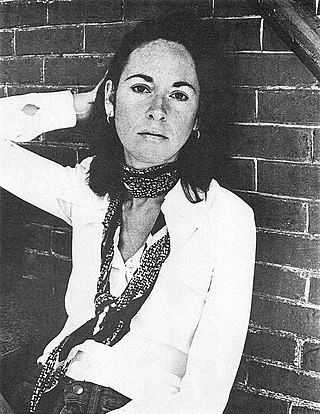
Louise Elisabeth Glück was an American poet and essayist. She won the 2020 Nobel Prize in Literature, whose judges praised "her unmistakable poetic voice that with austere beauty makes individual existence universal". Her other awards include the Pulitzer Prize, National Humanities Medal, National Book Award, National Book Critics Circle Award, and Bollingen Prize. From 2003 to 2004, she was Poet Laureate of the United States.

Josiah Gilbert Holland was an American novelist, essayist, poet and spiritual mentor to the Nation in the years following the Civil War. Born in Western Massachusetts, he was “the most successful man of letters in the United States” in the latter half of the nineteenth century and sold more books in his lifetime than Mark Twain did in his.

Frederick Goddard Tuckerman was an American poet, remembered mostly for his sonnet series. Apart from the 1860 publication of his book Poems, which included approximately two-fifths of his lifetime sonnet output and other poetic works in a variety of forms, the remainder of his poetry was published posthumously in the 20th century. Attempts by several 20th century scholars and critics to spark wider interest in his life and works have met with some success and Tuckerman is now included in several important anthologies of American poetry. Though his works appear in 19th century anthologies of American poetry and sonnets, this reclusive contemporary of Emily Dickinson, sometime correspondent of Nathaniel Hawthorne, Ralph Waldo Emerson and Henry Wadsworth Longfellow, and acquaintance of Alfred, Lord Tennyson, remains in relative obscurity.
Confessional writing is a literary style and genre that developed in American writing schools following the Second World War. A prominent mode of confessional writing is confessional poetry, which emerged in the 1950s and 1960s. Confessional writing is often historically associated with Postmodernism due to the features which the modes share: including self-performativity and self-reflexivity; discussions of culturally taboo subjects; and the literary influences of personal conflict and historical trauma. Confessional writing also has historical origins in Catholic confessional practices. As such, confessional writing is congruent with psychoanalytic literary criticism. Confessional writing is also a form of life writing, especially through the autobiography form.

Romantic poetry is the poetry of the Romantic era, an artistic, literary, musical and intellectual movement that originated in Europe towards the end of the 18th century. It involved a reaction against prevailing Enlightenment ideas of the 18th century, and lasted approximately from 1800 to 1850. Romantic poets rebelled against the style of poetry from the eighteenth century which was based around epics, odes, satires, elegies, epistles and songs.
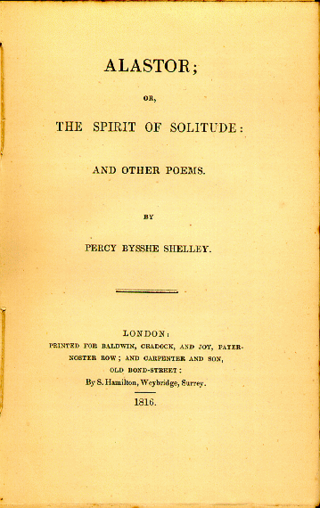
Alastor, or The Spirit of Solitude is a poem by Percy Bysshe Shelley, written from 10 September to 14 December in 1815 in Bishopsgate, near Windsor Great Park and first published in 1816. The poem was without a title when Shelley passed it along to his contemporary and friend Thomas Love Peacock. The poem is 720 lines long. It is considered to be one of the first of Shelley's major poems.

William De Witt Snodgrass was an American poet who also wrote under the pseudonym S. S. Gardons. He won the 1960 Pulitzer Prize for Poetry.

Helen Vendler was an American academic, writer and literary critic. She was a professor of English language and history at Boston University, Cornell, Harvard, and other universities. Her academic focus was critical analysis of poetry and she studied poets from Shakespeare and George Herbert to modern poets such as Wallace Stevens and Seamus Heaney. Her technique was close reading, which she described as "reading from the point of view of a writer".
Aaron Shurin is an American poet, essayist, and educator. He is the former director of the Master of Fine Arts in Writing Program at the University of San Francisco, where he is now Professor Emeritus.
Nationality words link to articles with information on the nation's poetry or literature.
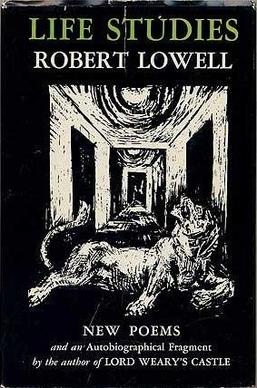
Life Studies is the fourth book of poems by Robert Lowell. Most critics consider it one of Lowell's most important books, and the Academy of American Poets named it one of their Groundbreaking Books. Helen Vendler called Life Studies Lowell's "most original book." It won the National Book Award for Poetry in 1960.
Macha Louis Rosenthal was an American poet, critic, editor, and teacher. The W. B. Yeats Society of New York renamed their award for achievement in Yeats studies the M. L. Rosenthal Award after Rosenthal's death. His 1959 essay, Poetry as Confession, is credited with being the first application of the term 'confession' to the writing of poetry and therefore for the naming of the confessional poetry movement.

In Defense of Reason is a three-volume work of literary criticisms by the American poet and literary critic Yvor Winters. First published in 1947, the book is known for its meticulous study of metrical verse and for its examples of Winters' system of ethical criticism.

Romanticism was an artistic, literary, and intellectual movement that originated in Europe toward the end of the 18th century. Scholars regard the publishing of William Wordsworth's and Samuel Coleridge's Lyrical Ballads in 1798 as probably the beginning of the movement in England, and the crowning of Queen Victoria in 1837 as its end. Romanticism arrived in other parts of the English-speaking world later; in the United States, about 1820.
References
- Rosenthal, M. L., Our Life in Poetry: Selected Essays and Reviews, Persea Books, New York, 1991, ISBN 0-89255-149-6.